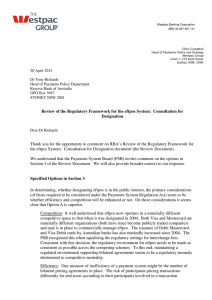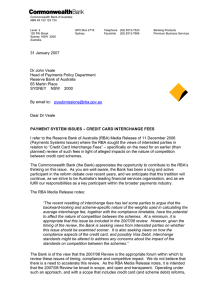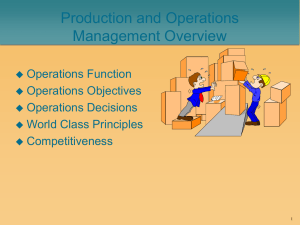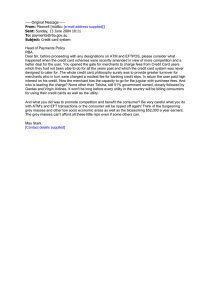6 August 2012 Dr Tony Richards Head of Payments Policy Department
advertisement
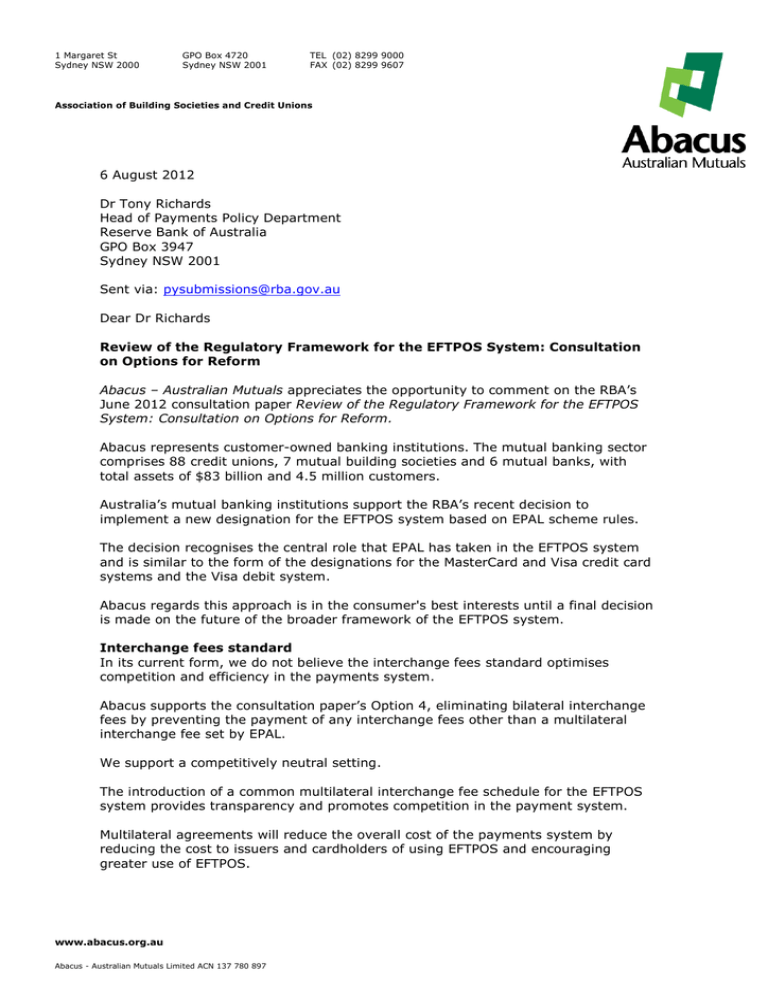
1 Margaret St Sydney NSW 2000 GPO Box 4720 Sydney NSW 2001 TEL (02) 8299 9000 FAX (02) 8299 9607 Association of Building Societies and Credit Unions 6 August 2012 Dr Tony Richards Head of Payments Policy Department Reserve Bank of Australia GPO Box 3947 Sydney NSW 2001 Sent via: pysubmissions@rba.gov.au Dear Dr Richards Review of the Regulatory Framework for the EFTPOS System: Consultation on Options for Reform Abacus – Australian Mutuals appreciates the opportunity to comment on the RBA’s June 2012 consultation paper Review of the Regulatory Framework for the EFTPOS System: Consultation on Options for Reform. Abacus represents customer-owned banking institutions. The mutual banking sector comprises 88 credit unions, 7 mutual building societies and 6 mutual banks, with total assets of $83 billion and 4.5 million customers. Australia’s mutual banking institutions support the RBA’s recent decision to implement a new designation for the EFTPOS system based on EPAL scheme rules. The decision recognises the central role that EPAL has taken in the EFTPOS system and is similar to the form of the designations for the MasterCard and Visa credit card systems and the Visa debit system. Abacus regards this approach is in the consumer's best interests until a final decision is made on the future of the broader framework of the EFTPOS system. Interchange fees standard In its current form, we do not believe the interchange fees standard optimises competition and efficiency in the payments system. Abacus supports the consultation paper’s Option 4, eliminating bilateral interchange fees by preventing the payment of any interchange fees other than a multilateral interchange fee set by EPAL. We support a competitively neutral setting. The introduction of a common multilateral interchange fee schedule for the EFTPOS system provides transparency and promotes competition in the payment system. Multilateral agreements will reduce the overall cost of the payments system by reducing the cost to issuers and cardholders of using EFTPOS and encouraging greater use of EFTPOS. www.abacus.org.au Abacus - Australian Mutuals Limited ACN 137 780 897 An exclusively multilateral system will also increase competition in debit card issuing and acquiring by removing negotiation of interchange fees by new participants as a barrier to entry. Competitive neutrality cannot be achieved in the EFTPOS scheme when dominant players can maintain bilateral agreements that deliver a competitive advantage over other stakeholders. This is why Abacus cannot support the RBA’s preferred option, Option 3, placing bilateral and multilateral interchange fees under a common benchmark. We do not believe this passes the public interest test as the RBA notes that “participants with bargaining power may be able to retain or negotiate interchange fee arrangements more favourable to them than the multilateral interchange fee schedule set by EPAL.” EFTPOS will always be at a disadvantage to scheme debit if issuers have to pay, rather than earn, interchange fees and the continued existence of these ‘negative’ interchange fees in bilateral interchange fee arrangements is highly anomalous. The study of debit and credit card schemes more than a decade ago by the RBA and the ACCC noted: “The payment of a debit card interchange fee to acquirers is an arrangement unique to Australia. In other countries, the payment is to the card issuer or there are no interchange fees at all."1 The RBA raised concerns about bilateral arrangements continuing “indefinitely” in its November 2009 paper A revised interchange standard for the eftpos system. Option 4 would remove these concerns. No-discrimination provisions Given our position on bilateral agreements outlined above, Abacus supports Option 2, omitting the no-discrimination provisions from a new Access Regime since all new entrants would be able to rely on the multilateral interchange fee schedule set by EPAL to access the system on the same terms as other participants. Connection charges Until alternative arrangements are put forward by EPAL, and supported by industry, Abacus believes the interests of mutual ADIs are best served if connection charges continue to be regulated through the Access Regime. Abacus therefore supports Option 1, putting in place an access charge benchmark that is the same as provided for in the current Access Regime. Under arrangements, a new connection charge benchmark would apply from January 2014, based on a new survey of connection costs conducted during 2013. 1 Debit and Credit Card Schemes in Australia: A Study of Interchange Fees and Access – RBA/ACCC, October 2000. 2 We also note that any new Access Regime that may arise from this review is unlikely to be put in place by the RBA until late 2012. Given this timetable, we agree with the RBA’s observation that the scope for bringing forward the recalculation of the connection charge benchmark would be limited. Given this context, Abacus believes the interests of the public and industry are best served by maintaining an orderly transition to a revised connection charge benchmark, via the 2013 cost survey. Please contact Jim Aliferis, Senior Policy Adviser, on 02 8299 9033 or jaliferis@abacus.org.au to discuss any aspect of this submission. Yours sincerely MARK DEGOTARDI Head of Public Affairs 3
